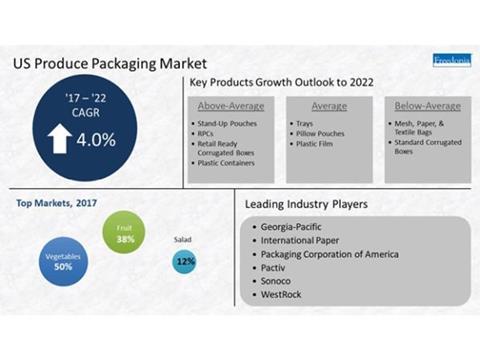
Demand for new reusable plastic containers) for fresh produce is projected to increase 7.6% per year to $185 million in 2022, making them one of the fastest growing produce packaging products, Freedonia Group reports.
Gains will be due to the implementation of RPC-based logistical systems for produce by grocery chains. Walmart and several regional grocery chains have adopted full or partial RPC-based systems.
This growth in demand is likely due to retailers aiming to reduce the amount of single use plastics as consumer awareness of plastic waste and its detrimental effect on the environment grows. With environmental awareness generally higher still in Europe, growth potential there can be expected to be even higher.
Demand for new RPCs will increase much faster than the overall produce packaging average but is expected to continue decelerating due to the size of the existing RPC pool. These and other trends are presented in Produce Packaging Market in the US, 7th Edition, a new study from The Freedonia Group, a Cleveland-based industry research firm.
The number of RPCs in use is much larger than demand due to the multiple trips made per year by most of these containers and their ability to be used for up to 100 trips.
Still, there will be growth opportunities due to replacement needs due to wear or breakage, compatibility with modular corrugated box systems and other packaging formats, handling efficiencies due to size standardization, stacking efficiencies compared to boxes and efforts to reduce overall packaging waste.
US demand for all types of produce packaging is projected to increase 4.0% per year to $6.5 billion in 2022. This will represent an improvement over the 2012-2017 period, when domestic produce production declined. Beyond a modest rebound in production, a number of other factors will boost demand, including increased packaging of heretofore unpackaged produce items, and the widening availability of cut and shredded produce in convenience-oriented packaging.
Produce Packaging Market in the US, 7th Edition (published 6/2018, 231 pages) is available for $5500 from The Freedonia Group.













